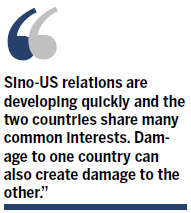US
Long-term perspective vital in Sino-US ties
By Xiao Feng (China Daily)
Updated: 2010-08-27 16:26
 |
Large Medium Small |
BEIJING - Common interests have allowed China and the United States to weather through the ups and downs over the past 40 years.
Common interests have always been constant between the two, although they have taken different forms at different times. For example, after the terrorist attack in New York City on Sept 11, 2001, two nations both took responsibility to counter terrorism. When the financial crisis took place in 2008, they fought against the crisis cooperatively.

Still, their complex relationship has been very difficult to define. What exactly is the nature of the Sino-US relationship? They are neither friends nor enemies. Using the word "partners," however, is a positive outlook on their neutral relationship.
A more accurate definition of their relationship is that it is based on cooperation and competition. Partners can be friends and competitors after all. Their relationship is based on the two countries' foreign affairs and their inherent needs. It's about answering the question of "How do China and the US treat one another?" The word "partnership" reflects their needs.
 Several international relations experts recently said the usage of "partnership" was employed to make the relationship sound a lot better than it is, but I don't agree with that sentiment. The term "a superficial friend" cannot reflect the complexities in Sino-US ties. Instability in their relationship is and will be determined by complexities in the relationship instead of issues within a superficial friendship.
Several international relations experts recently said the usage of "partnership" was employed to make the relationship sound a lot better than it is, but I don't agree with that sentiment. The term "a superficial friend" cannot reflect the complexities in Sino-US ties. Instability in their relationship is and will be determined by complexities in the relationship instead of issues within a superficial friendship.
The US recently took demonstrative actions around China, which I will not cast off with a simple analysis. Unlike previous incidents such as the bombing of the Chinese embassy in Belgrade in 1998, or the collision between a US spy plane and a Chinese plane over the South China Sea in 2001, the recent moves by the US were well designed strategic moves.
What is the real motive behind these moves? It is likely that the US raced forward to adjust its strategies toward China and East Asia, which will influence future Sino-US dealings.
Disputes over the South China Sea were flared since US Secretary of State Hillary Clinton claimed US interests there at a regional security forum held in Vietnam in July. US warships then arrived in Vietnam for a joint military exercise. It seems that the US is trying to sow discord between China and China's neighboring countries to contain China.
Chinese media said that the US intends to build an Asian version of NATO to cage China. Is a strategic contest between China and the US unavoidable, as the media have asked?
In my opinion, the situation is unlikely to become very intense because there are no substantial changes in the Sino-US relationship. There are more common interests than differences between the two. They need each other to continue developing and neither China nor the US can withstand any confrontation.
It will also be difficult for the US to build an Asian version of NATO in Southeast Asia. Southeast Asian countries hold a multilayered attitude toward the US. On the one hand, they hope that the US balances out China in the region, but on the other hand, this doesn't mean that they are willing to side with the US to contain China.
Moreover, the US has the strongest military in the world, but the world is no longer a unilateral place. It is impossible for the US to do whatever it wants on the South China Sea.
Last but not least, actions taken by the US government will reflect the landscape of opinions before its midterm elections in November. But after the election, the mainstream opinion in the US government might be different.
Therefore, I believe Sino-US ties will face future troubles and challenges, which China should be prepared to deal with. But I doubt that the Sino-US relations will become totally hostile. Sino-US relations are developing quickly and the two countries share many common interests. Damage to one country can also create damage to the other.
Joseph Nye, professor at Harvard University, recently told the People's Daily that China and the US have many common interests and that the two countries have to collaborate. China and the US have no choice but to become friends. The two nations should further develop this friendship, he said.
If hawkish politicians in the US can listen to words of wisdom rather than insisting on worsening and damaging Sino-US relations, the US can avoid shooting themselves in the foot.
The author is a research fellow at the China Center for Contemporary World Studies in Beijing.
For China Daily